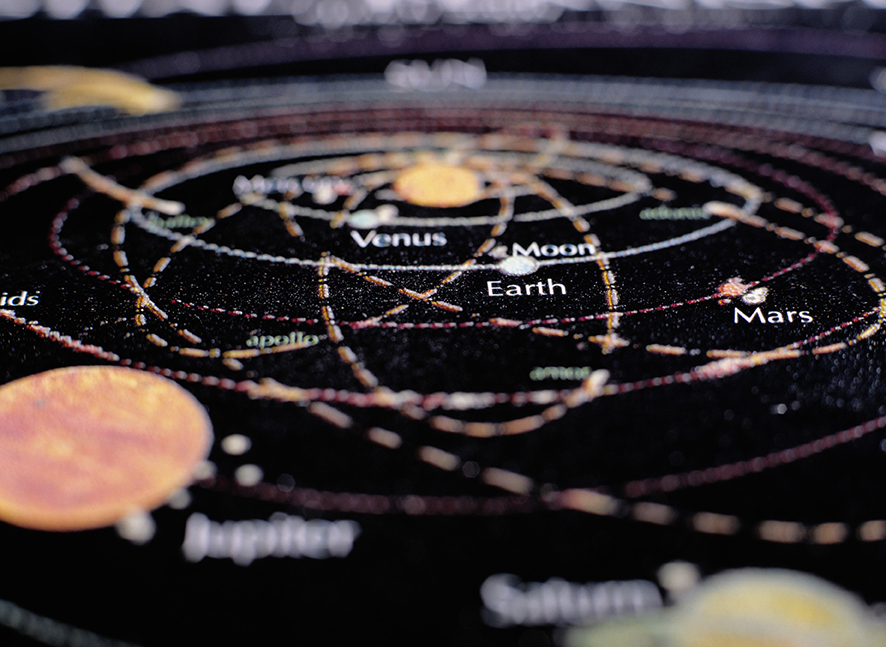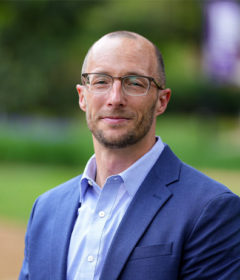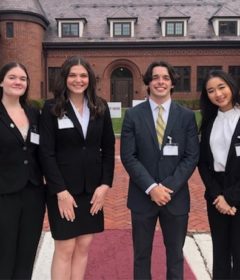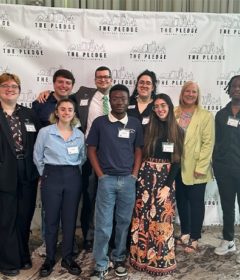Are the Big Questions Still Relevant
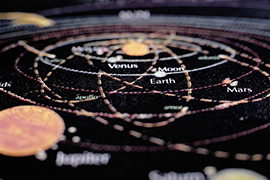
by Bill Noblitt
My son, a history major, phoned to ask me: “What’s the theme of the next issue of Stetson Magazine?”
“We decided to deal with a light topic this time,” I told him, tongue-in-cheek. “It’s going to focus on What’s the Meaning of Life.”
“So you’re putting out a magazine for unemployed philosophy majors?” he asked with a sarcastic beat to his voice.
“But shouldn’t people from all walks of life consider a perennial question such as this one?” I defensively asked.
And his reaction made me wonder: Are the Big Questions, such as this one, irrelevant today? Is there no place left to use our reason to ponder the meaning of love and desire; living a virtuous life; creating an ideal government; understanding truth, goodness, beauty and the nature of evil; questioning the existence of God, the soul, reality, justice, wisdom that keep us from tyranny, anger, hatred and prejudice? What does it mean to do the right thing vs. the wrong thing and, in fact, what is the right thing anyway?
Has the academy become so career-first-and-thinking-later that it can’t take time to corrupt its youth, as Socrates was charged, with questions such as these?
The economy, along with high tuition costs and unemployment, seems to drive the desire for career building over personal inquiry. In this context, there is little time for reflection.
However, can’t both exist side by side with personal reflection enhancing the other?
Reflection takes time too. In our day-to-day lives, we’re too busy trying to make a living for our families, attending our children’s soccer and baseball tournaments, and just getting by without the weight of asking ourselves what our lives truly mean.
According to one person interviewed for this article, we’re just too tired at the end of the day for reflection.
If these questions sound familiar, it’s because the ancients voiced them thousands of years ago. But I believe they go back much further, across cultures and into humanity’s search for meaning.
The Buddha asked the same questions on his way to enlightenment and urged his followers to “Find out for yourself what is truth, what is real.” Wisdom, ethical conduct and mental cultivation prodded him all his life to live rightly and with mindfulness.
And sometimes the questions change. In her book The Second Sex, the modern existentialist philosopher Simone de Beauvoir asked if the good society values its women less than its male counterparts.
In our postmodern world of technological gadgets and short attention spans, how can these questions resonate with us today?
Some think them old hat and believe they should remain papyrus dust. Is this just navel-gazing at its worst?
At one time, I might have thought so.
Today, though, I’m wondering about those Big Questions. Maybe the Big Questions are most important because they trickle into our primal memory banks and live within each of us, whether we want them to or not.
They seem fired by our curiosity.
Socrates, Plato and their ideas come in and out of style, but their questions never seem stale because they appear to be part of our DNA. Their questions and answers appear to go on past the end of each dialogue and into infinity with the universal “why.”
“Humans never lose that child’s need to know ‘why,’” explained Kimberly D. S. Reiter, Ph.D., associate professor of history. “If we did, we’d stop being human. We’re flawed, yes, but we’re also determined to seek the next bend in the path, the next signpost, the next reason to take a quest, a reason to find that grail, even if we know we will never find it,” she said.
“Without meaning, like automatons, we question nothing,” she added. “And these are questions that no one can sufficiently answer.”
Reiter herself just received a National Endowment for the Humanities Enduring Questions Grant that is given to applicants who postulate a great question on the meaning of life.
Should Students Question
New York Times columnist David Brooks in his book The Road to Character and his article titled “The Moral Bucket List” wrote that we’ve somehow forgotten how to ask ourselves these important questions. “Our culture and our educational systems spend more time teaching the skills and strategies you need for career success than qualities you need to radiate that sort of inner light,” he said. “Many of us are clearer on how to build an external career than on how to build inner character. But if you live for external achievement, years pass and the deepest parts of you go unexplored and unstructured.”
People on the road to inner light, Brooks argued, “do not find their vocations by asking, what do I want from life? They ask, what is life asking of me?”
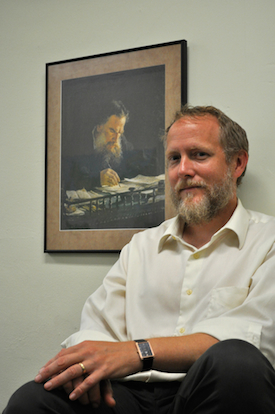
Michael Denner, Ph.D., professor of Russian studies and head of Stetson’s Honors Program, props his feet on his desk, leans back in his chair, and loosens his tie as he ponders my question. “Sure, there are plenty of people who come to Stetson and think that if they hand over a bunch of money, we will give them a degree, and they will, in turn, go on and make lots of money,” he said, the sunlight streaming across his face and into his second-floor office.
“Not my cup of tea.
“I believe our students come here expecting us to address these questions,” he stressed. “But I also believe they come here thinking they are going to get the answers as well.”
Not surprisingly, however, Denner has found students eager to discuss these questions, debate them, present their own ideas and listen to the ideas of others.
“Stetson is exactly the right place for these conversations to take place,” he said. Because of their liberal arts natures, places like Stetson University, then, are islands of thought and reflection where faculty and students still grapple with these perennial questions and not just in philosophy and religion, but also across the disciplines.
As Associate Provost Rosalie Richards declared: “For Stetson University, our mission of helping students go on to live lives of bold significance has everything to do with asking the Big Questions. It has everything to do with students, faculty, staff and alumni continuously questioning who they are becoming.”
And like many universities, Stetson wrestles with how to engage students with the Big Questions. Lecture? Fact-based standardized tests?
In an Association of American Colleges and Universities’ article, the Julian Clarence Levi Professor in the Humanities at Columbia University Andrew Delbanco asked: “So what to do for our students while defending their freedom to answer such questions on their own?
“It’s actually pretty simple,” he pointed out. “Put in front of them some sample of great texts (we can argue forever over exactly which ones — so we should put aside that temptation and get on with it) that place the Big Questions front and center, and let the discussion begin.”
Everything Old is New Again
This method hearkens back to famed former University of Chicago President Robert Maynard Hutchins and his Great Books strategy.
According to Hutchins in The University of Utopia, “The object of the educational system, taken as a whole, is not to produce hands for industry or to teach the young how to make a living. It is to produce responsible citizens.”
Similarly, W.E.B. Du Bois, the first black graduate of Harvard, wrote: “I insist that the object of all true education is not to make men carpenters, it is to make carpenters men.”
Many believe Hutchins pushed the ideas of dead white males. However, he believed in periodically updating the Great Books list. “In the course of history,” he said, “new books have been written that have won their place in the list. Books once thought entitled to belong to it have been superseded.
“It is the task of every generation to reassess the tradition in which it lives, to discard what it cannot use, and to bring into context with the distant and intermediate past the most recent contributions to the Great Conversation,” he declared.
And what’s the purpose of asking the Big Questions anyway? Hutchins would probably say to inspire wisdom and explore ideas through the rigorous Socratic method. Hutchins believed that society must “bring to bear upon its present problems the wisdom that lies in the works of its greatest thinkers.”
Wisdom. Such a slippery word. How do we help our students learn wisdom? A group of University of Chicago researchers and cognitive psychologists believe, though, that wisdom can be taught. U of C psychology Professor Howard Nusbaum, Ph.D., notes that the elements of wisdom are the ability to engage in the intellectual struggle and reflect (“to stick with a problem that’s hard and think about it”), to have humility, to be able to engage in a mental self-examination, and to possess creativity.
Robert Sternberg, Ph.D., a professor of human development at Cornell University, says, “I got interested in wisdom because I saw people who were smart doing foolish things. I even authored a book on why smart people can be so stupid. The conclusion I reached is that people can be really smart in an analytic sense — an SAT sense, but their intelligence actually can interfere with their being wise, because they figure they’re so smart they can’t do dumb or foolish things.”
Part of the wisdom research team at Chicago, Sternberg believes that wisdom can be taught but that it must be part of the curriculum, not just a “Wisdom Day” or here-is-your- wisdom-exercise. To him, wisdom takes balance in one’s life and includes “applying your abilities, and your knowledge, and your passions for a common good.”
Because of its age and changes through history, the Socratic method may seem outdated. After all, Socrates — since he didn’t write down his thoughts but channeled them through Plato — didn’t leave us a manual on how to ask these questions. Is the Socratic method a guessing game with the questioner trying to prod the student to discover the answer only the teacher truly knows? Or is it something much deeper, where the skilled questioner and the student learn through probing questions that lead to the truth about a topic?
It’s not easy using the Socratic method. Its success depends on the rigor of the questions and the selfless verbal assault on errors in thought.
There Once Was a Sultan…
Stetson chemistry Professor Ramee Indralingam, Ph.D., tells the story of a sultan who told all his wise men to go and find out everything about the history of the world and bring that knowledge back to him. And the wise men wrote so much that they brought 30,000 camels loaded with books to the sultan’s palace.
“I can’t read all this,” the sultan fumed. “Go back and make it shorter.”
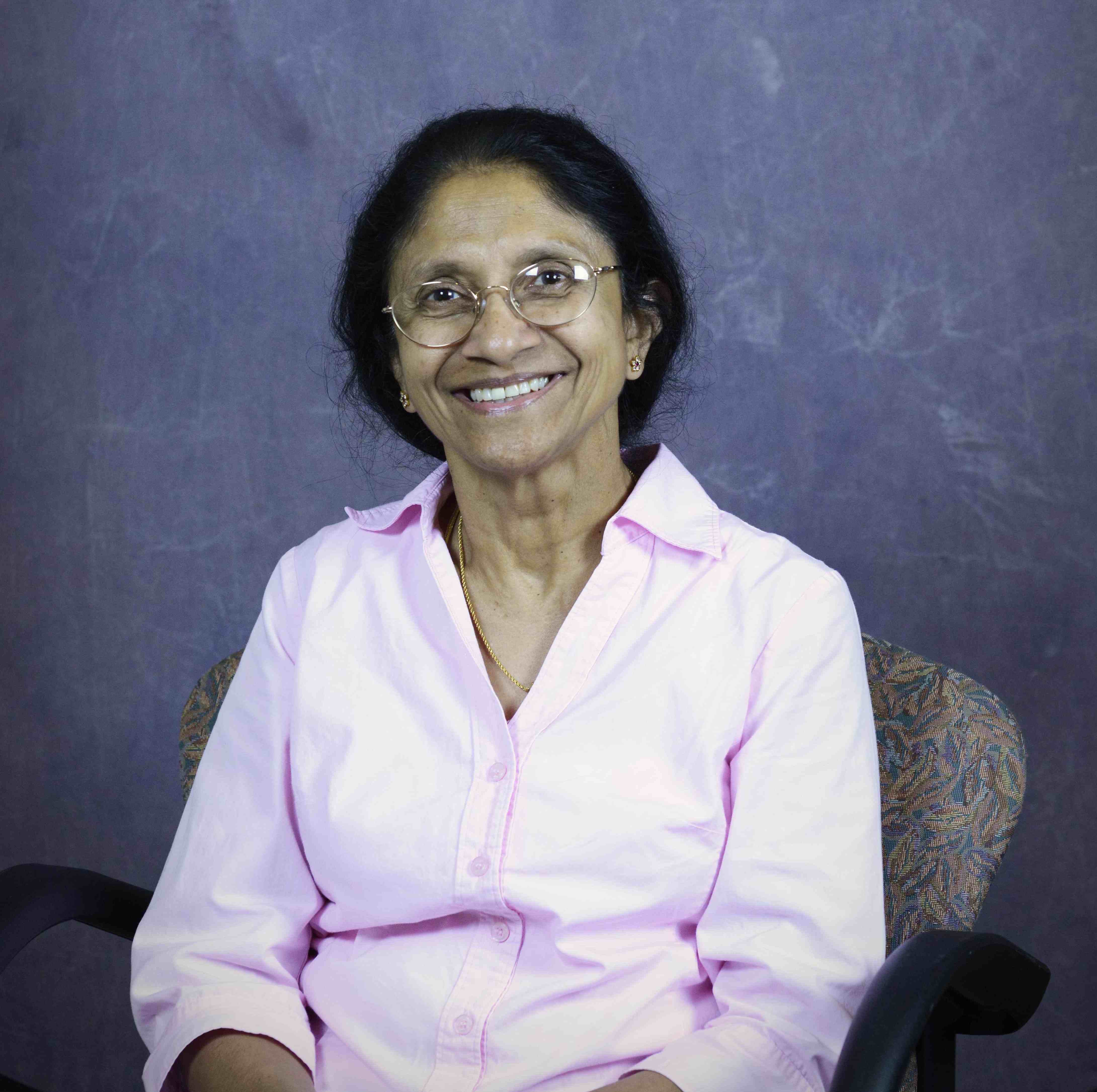
So they went out and came back with several hundred camels, and each time, the sultan would tell them to make it shorter until the number of camels got fewer and fewer.
Finally, one wise man said: “I will tell you the history of the world. They were born, they lived and they died.”
“I don’t know what our purpose is,” Indralingam said. “I don’t know why we were born. I don’t know if humans will ever know.
“But sometimes it’s the search that’s the reason,” Indralingam pointed out.
Sometimes, she believes, it’s hubris that causes humans to feel they are special, and thinking this way has led to many of the world’s problems. “Evolution will decide our fate as a species,” she explained.
Furthermore, Indralingam understands the problem of exploring the Big Questions in a classroom. “Some students will say, ‘I don’t know, and I don’t care. I don’t think about them.’”
But what happens if they don’t explore the Big Questions? “Thousands of students, not trained in hard thinking but starved for ideas and understanding, will retreat to the easier alternatives — pop philosophies of self-help, exotic religious practices, extremist politics,” wrote Robert Solomon, Ph.D., and Kathleen Higgins, Ph.D., in their book, The Big Questions: A Short Introduction to Philosophy.
Asking the Big Questions
“That’s what we do in religious studies,” declared Professor Kandy Queen-Sutherland, Ph.D.
But are they important to a Stetson student’s education? “Not to ask the Big Questions is to live life wading in shallow waters,” she said. “We have a responsibility to explore them with our students.”
Queen-Sutherland believes that exploring the Big Questions helps students to think critically and to analyze and reflect, and that these skills will serve them throughout their lifetimes. She also believes this exploration helps students to understand another’s point of view even if different from their own. “You learn to step back and look at something in a different way,” Queen-Sutherland explained.
“That’s not to throw money out the window either,” she said. “Jobs are important. Our world is based on economic factors. That’s the reality. If you’re always anxious about money, then you’re stressed. If you’re flush with it, you spend all your time trying to protect it.
“So how do we find balance in our lives?” she asked. It takes wisdom to find that balance, she said. “The most ancient and universal of all literature is wisdom literature. That literature speaks about the good life as one lived in balance. It asks: How do we keep things in check?”
And “work” isn’t a bad word, according to Queen-Sutherland. “It’s not only to sustain a lifestyle,” she said. “It’s for our own fulfillment. To find a job that’s not just work but our passion. So to be able to reflect on those questions in a university setting is incredibly important to finding that passion.”
In this respect, the Big Questions become something more than a luxury. “The Big Questions are the reason I teach,” Queen-Sutherland said — “to take young people to an exploration of those deeper issues and to be reflective and purposeful about our life’s choices.”
But do Stetson professors raise these questions across the curriculum at Stetson?
“Yes, this isn’t lip service,” she said. “You’ll find them in courses in business and in music and law and all through the College of Arts and Sciences.” As an example, Queen-Sutherland points to the School of Business Administration and the work of several colleagues who are “serious about business ethics and social justice issues.”
Messing With Mother Nature
It’s not easy asking the Big Questions. They can make your head, and sometimes your heart, hurt. Take Assistant Professor of philosophy Melinda Hall’s, Ph.D., class on environmental ethics.
“This climate change thing has been a really large shadow over our moral deliberation,” she said.
In fact, Mark Urban, an ecologist at the University of Connecticut, in the journal Science reported that climate change “could drive to extinction as many as one in six animal and plant species.” Most experts believe the real toll could be even worse, according to an article in the New York Times.
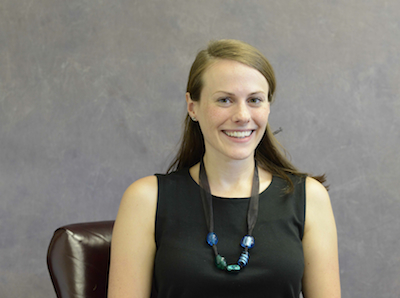
“The number of extinctions may well be two to three times higher,” said John J. Wiens, an evolutionary biologist at the University of Arizona.
Knowing the possible global catastrophe has heightened tension in Hall’s class. For example, she shows her students how a handful of panicky bioethicists are encouraging human enhancement procedures to stem the negative impact of climate change. Do we mess with Mother Nature?
“Their paper suggested we should make smaller children because of the coming famine,” declared Hall. “I see this as casting about for any idea to mitigate the coming catastrophe. Lower-birth-weight babies would have a negative impact across a child’s entire life.”
Hall’s response is that people are starving right now, and she sees the irony.
“We are using a lot of energy and resources in reproductive technologies, which might counter climate change, but, at the same time, is a crisis of energy use the cause of that climate change?
“It’s like we’re supposed to just ‘do’ instead of be ‘thinkers.’”
In this environment, she’s telling her students not to throw moral deliberation out the window, “because we all live in catastrophe since we are all mortal.”
“It’s really tempting to say that the meaning will come later, and we are just too busy now to think about it,” she added. “This is just what life is like. But we should put off that temptation and live a life with meaning.”
Conversations Over Coffee
I remember commuting to Chicago, where I’d drop into a bookstore an hour before work for coffee and a bagel. I stumbled on two books there that I read most every day: Epictetus’ Discourses, which were, in fact, notes taken by a devoted follower, and Marcus Aurelius’ Meditations.
Here were two Stoics, one a former slave and the other a Roman emperor. Their short works captivated me in different ways. Their Stoic beliefs converged, with Epictetus telling me that “the life of wisdom is a life of reason. It is important to learn how to think clearly.”
Marcus, on the other hand, seemed to yell at himself and me: “Purge your mind of all aimless and idle thoughts, especially those that pry into the affairs of others or wish them ill.”
They became my friends. I leaned on their wisdom through my own troubled times.
Our human condition seemed to resonate in their conversations with me. I wondered how much I had missed. What other works out there might inspire me, and I began to feel like a person stuck in the Renaissance uncovering amazing works of art. Like the ancient Laocoön statue that twisted its way into Michelangelo’s consciousness, I began to uncover ideas that rang true, not only for those authors’ times, but for all time.
I rushed to reflect on the Big Questions in my own life and came out into the lasting light.
Bill Noblitt is editor of Stetson Magazine. The upcoming issue (due out at the end of June) will tackle some of these Big Questions.

